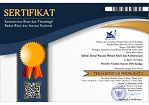Position of fatwa in Islamic law: the effectiveness of MUI, NU, and Muhammadiyah fatwas
Abstract
Keywords
Full Text:
PDFReferences
Amin, M. (2008) Fatwa dalam Sistem Hukum Islam. Jakarta: eLSAQ.
Amin, M. (2011) Himpunan Fatwa Majelis Ulama Indonesia Sejak 1975. Jakarta: Hijrah Saputra.
Anwar, S. (2007) Studi Hukum Islam Kontemporer. Jakarta: RM Books.
Caeiro, A. (2006) ‘The Shifting Moral Universes of the Islamic Tradition of Ifta’: A Diachronic Study of Four Adab al-Fatwa Manuals’, The Muslim World, 96, pp. 661–685.
Dahlan, A. A. (1996) Ensiklopedi Hukum Islam. Jakarta: Ichtiar Baru van Hoeve.
Depdikbud (1997) Kamus Besar Bahasa Indonesia. Jakarta: Balai Pustaka.
Diamil, F. (1999) Filsafat Hukum Islam. Jakarta: Logos.
Effendi, S. (2009) Ushul Fiqh. Jakarta: Kencana.
Fatah, R. A. (2006) Analisis Fatwa Keagamaan dalam Fiqih Islam. Jakarta: PT. Bumi Aksara.
Fu’ad, M. and Abdul-Baqi (1981) Mu`jam al-mufahras li alfaz al-Qur’an al-Karim. Dar al-fikr.
Garna, J. K. (2009) Metoda Penelitian: Kualitatif. Bandung: The Judistira Foundation dan Primaco Akademika.
Hallaq, W. B. (1994) ‘From Fatwās to Furūʿ: Growth and Change in Islamic Substantive Law’, Islamic Law and Society, 1(1), pp. 29–65. doi: 10.2307/3399430.
Hasballah, A. (1976) Ushul al-Tasyri’ al-Islami. Mesir: Dar al-Ma’arif.
Jaya, A. (1996) Konsep Maqashid al-Syariah Menurut Syatibi. Jakarta: Raja Grafindo Persada.
Kaptein, N. J. G. (2004) ‘The voice of the “Ulamǎ”: Fatwas and religious authority in Indonesia’, Archives de Sciences Sociales des Religions, 125(1), pp. 115–130. doi: 10.4000/assr.1038.
Kechichian, J. A. (1986) ‘The Role Of The Ulama In The Politics Of An Islamic State: The Case Of Saudi Arabia’, International Journal of Middle East Studies, 18(1), pp. 53–71. doi: 10.1017/S002074380003021X.
Koentjaraningrat (1991) Metode-Metode Penelitian Masyarakat. Jakarta: PT. Gramedia Pustaka Utama.
Layish, A. (1991) ‘The “fatwā” as an Instrument of the Islamization of a Tribal Society in Process of Sedentarization’, Bulletin of the School of Oriental and African Studies, University of London, 54(3), pp. 449–459. Available at: http://www.jstor.org/stable/619054.
Miles, M. B. and Huberman, A. M. (1992) Analisis Data Kualitatif: Buku Sumber Tentang Metode-Metode Baru. Jakarta: UI Press.
Mudzhar, M. A. (1992) Fatwas of the Council of Indonesian Ulama: a Study of Islamic Legal Thought in Indonesia, 1975-1988. Michigan: Ann Arbor: U.M.I.
Mudzhar, M. A. (1993) Fatwa-Fatwa Majelis Ulama Indonesia: Sebuah Studi Tentang Pemikiran Hukum Islam di Indonesia 1975-1988. Jakarta: INIS.
Mudzhar, M. A. (2012b) ‘Tantangan Studi Hukum Islam di Indonesia Dewasa Ini’, Jurnal Indo-Islamika, 2(1), pp. 91–103. doi: 10.15408/idi.v2i1.1656.
Mudzhar, M. Atho (2012a) ‘Prolog: Fatwa MUI Sebagai Obyek Kajian Hukum Islam dan Sumber Sejarah Sosial’, in Mudzhar, Mohamad Atho, Yusuf, C. F., and Nahrawi, N. (eds) Fatwa Majelis Ulama Indonesia (MUI) dalam perspektif hukum dan perundang-undangan. Jakarta: Puslitbang Kehidupan dan Diklat Kementrian Agama.
Niam, M. A. (2008) Sadd al-Dzari’ah dan Aplikasinya dalam Fatwa Majelis Ulama Indonesia. UIN Syarif Hidayatullah Jakarta.
Qardawi, Y. (1997) Fatwa Antara Keadilan dan Kecerobohan. Jakarta: Gema Insani Press.
Rusli (2011) ‘Tipologi Fatwa Di Era Modern: Dari Offline Ke Online’, HUNAFA: Jurnal Studia Islamika, 8(2), pp. 269–306. doi: 10.24239/jsi.v8i2.365.269-306.
Schacht, J. (1965) An Introduction to Islamic Law. London: Oxford University Press.
Shihab, M. Q. (1999) Fatwa-Fatwa Seputar Ibadah Mahdah. Jakarta: Mizan.
Syarifuddin, A. (1997) Ushul Fiqh. Jakarta: Penerbit Logos Wacana Ilmu.
Zahro, A. (2004) Tradisi Intelektual NU: Lajnah Bahtsul Masa’il NU 1926-1999. Yogyakarta: LKiS.
DOI: https://doi.org/10.18326/ijtihad.v22i1.53-72
Refbacks
- There are currently no refbacks.

This work is licensed under a Creative Commons Attribution-NonCommercial-ShareAlike 4.0 International License.
Ijtihad: Jurnal Wacana Hukum Islam dan Kemanusiaan by http://ijtihad.iainsalatiga.ac.id/ is licensed under a Creative Commons Attribution-ShareAlike 4.0 International License







